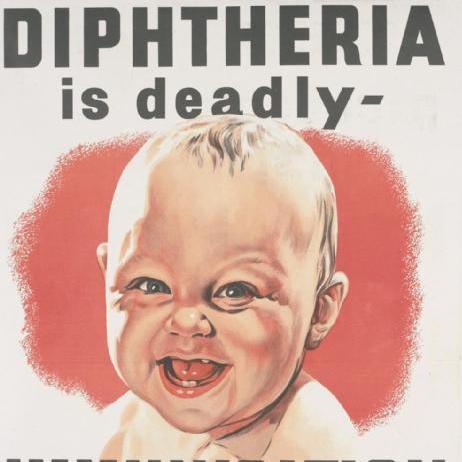Americans don't appreciate their government telling them what to do. Especially when it comes to health care, millions of people across the political spectrum react with hostility when the state tries to interfere in their personal affairs.
The anti-vaccine movement has successfully used this visceral distrust of government to battle immunization mandates, such as New Jersey's recent attempt (S2173) to eliminate religious exemptions for vaccines for students entering schools and daycare centers. Such laws, the anti-vax crowd proclaims, rob parents of the right to choose and give corrupt bureaucrats the authority to inject children with harmful chemicals.
These allegations are baseless, but activists will give their rhetoric a veneer of legitimacy by pointing to the US government's scheme to poison liquor during prohibition, which killed approximately 10,000 people, or the Tuskegee study, during which participants were denied treatment for syphilis and misled about the intent of the research.
This presents a dilemma for public health officials. Vaccines prevent the spread of disease, but many Americans, fearful they're part of another government-orchestrated science experiment, won't immunize their kids—and trying to force them only intensifies their opposition.
So, what's the solution? As any economist knows, people change their behavior in response to incentives. In this case, regulators could encourage parents to immunize their kids with policies that are both voluntary and effective, thus stemming the spread of serious diseases and undermining the anti-vaccine movement's most potent argument at the same time.
Vaccinate your kids, get a tax break
Ronald Reagan once said, “If you want more of something, subsidize it …” The former president's observation could prove useful to public health officials, who might consider enacting a tax credit for parents who vaccinate their children, as Australia did years ago. “[T]he Australian government provides financial incentives for parents to get kids vaccinated—specifically, in the form of tax credits. Physicians, too, receive a small payment when children get vaccinations on schedule,” Scientific American reported in 2015.
The tax credit proposal has also earned the endorsement of some prominent figures in the vaccine debate. “[I]t's a good idea,” pediatrician Paul Offit told me by email. Although he supports mandates, Offit added, “It's already clear that Australia will be the first country to eliminate cervical cancer [with the HPV vaccine] from its shores. We will be way behind.”
This approach may also prove rhetorically effective because anti-vaccine messaging is often perpetuated by libertarians and conservatives who dress up their activism as a defense of individual liberty. The same people are equally fierce opponents of taxation. A policy that allows Americans to keep more of their money in exchange for vaccinating their kids would therefore force the conservative wing of the anti-vaccine movement to oppose lower taxes.
Freedom has consequences
In the late 1980s, concerned parents–egged on by tort lawyers and activists like Barbara Loe Fisher–buried the pharmaceutical industry under a mountain of lawsuits alleging the DTP (diphtheria, tetanus, and pertussis) vaccine caused brain damage in their children, a claim debunked by later research. Skyrocketing litigation costs and the inability to obtain liability insurance convinced nearly every manufacturer to quit producing the vaccine, until Congress passed the National Childhood Vaccine Injury Act that alleviated the financial risk drug makers faced.
This brief history lesson illustrates how the anti-vaccine movement used the courts to change public policy. Why not turn the tables and hold them accountable for their activism in the same way? The logic is pretty simple. Higher immunization rates mean fewer cases of infectious diseases. If parents refuse to vaccinate their kids, thus putting everyone else at risk, they could be held liable for the consequences of that decision, UC Hastings law professor Dorit Reiss points out. Ronald Bailey, Reason Magazine's science correspondent (and a staunch libertarian), explains how this could work:
“For the sake of social peace, vaccine opt-out loopholes based on religious and philosophical objections should be maintained. States should, however, amend their vaccine exemption laws to require that people who take advantage of them acknowledge in writing that they know their actions are considered by the medical community to be putting others at risk. This could potentially expose vaccine objectors to legal liability, should their decisions lead to infections that could have been prevented.”
Many public health officials maintain that mandates are the best policy, citing evidence that they help preserve herd immunity. But experts have also argued that anti-vaccine activism is a primary driver of declining immunization rates. The movement's most effective tactic has been to play the underdog card, framing itself as David courageously battling “Big Pharma” Goliath. Mandating vaccines plays into this narrative by suggesting that governments are trying to foist something harmful on the public. As a team of University of Pennsylvania researchers pointed out in 2013, “mandates can increase parental perceptions of vaccine risks.”
Moreover, what did protesters chant as the New Jersey Assembly passed S2173? “We will not comply!” The controversy won't end with a vaccine mandate. A solution that encourages parents to immunize their children and holds them accountable when they don't deprives the anti-vaccine movement of its “message of liberty” rallying cry. Most importantly, these policies work. Speaking of financial incentives for physicians, the anti-vaccine outfit Children's Health Defense said as much in 2018:
“Ultimately, these subtle and not-so-subtle financial incentives and social pressures are likely to maintain widespread adherence by pediatricians to the [CDC's] vaccine schedule …”




